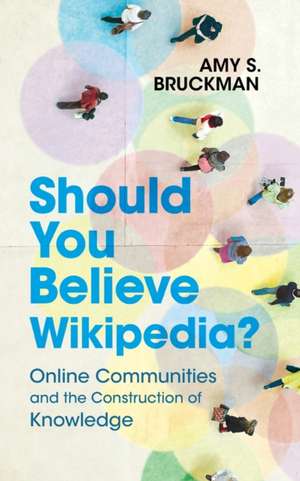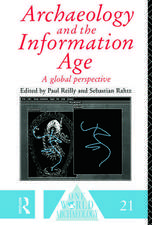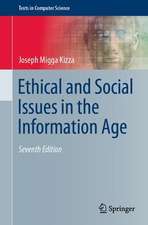Should You Believe Wikipedia?: Online Communities and the Construction of Knowledge
Autor Amy S. Bruckmanen Limba Engleză Paperback – 2 feb 2022
| Toate formatele și edițiile | Preț | Express |
|---|---|---|
| Paperback (1) | 91.47 lei 3-5 săpt. | +17.54 lei 4-10 zile |
| Cambridge University Press – 2 feb 2022 | 91.47 lei 3-5 săpt. | +17.54 lei 4-10 zile |
| Hardback (1) | 340.57 lei 6-8 săpt. | |
| Cambridge University Press – 2 feb 2022 | 340.57 lei 6-8 săpt. |
Preț: 91.47 lei
Preț vechi: 114.33 lei
-20% Nou
Puncte Express: 137
Preț estimativ în valută:
17.50€ • 19.01$ • 14.70£
17.50€ • 19.01$ • 14.70£
Carte disponibilă
Livrare economică 01-15 aprilie
Livrare express 15-21 martie pentru 27.53 lei
Preluare comenzi: 021 569.72.76
Specificații
ISBN-13: 9781108748407
ISBN-10: 1108748406
Pagini: 272
Dimensiuni: 128 x 197 x 15 mm
Greutate: 0.27 kg
Ediția:Nouă
Editura: Cambridge University Press
Colecția Cambridge University Press
Locul publicării:New York, United States
ISBN-10: 1108748406
Pagini: 272
Dimensiuni: 128 x 197 x 15 mm
Greutate: 0.27 kg
Ediția:Nouă
Editura: Cambridge University Press
Colecția Cambridge University Press
Locul publicării:New York, United States
Cuprins
Acknowledgments; Introduction; 1. Are online “communities” really communities?; 2. What can online collaboration accomplish?; 3. Should you believe Wikipedia?; 4. How does the internet change how we think?; 5. How do people express identity online, and why is this important for online interaction?; 6. What is bad online behavior, and what can we do about it?; 7. How do business models shape online communities?; 8. How can we help the internet to bring out the best in us all?
Recenzii
'This book reminds us of conversations we're not having about online life - with family, friends, with our political representatives - because we don't know where to start. The Internet seems so opaque, that we don't know to get traction on our concern that it no longer serves our human needs. This welcome volume suggests entry points for designers and users - to start those necessary conversations about how to make online life serve our emotional and social purposes. Both scholarly and down-to-earth, filled with compelling examples, it is a textbook for classrooms, dinnertables, and policy discussions.' Sherry Turkle, MIT, Author of The Empathy Diaries, Reclaiming Conversation, Alone Together, and Life on the Screen
'Should you believe Wikipedia? is an extremely useful book about the positive aspects of life online: supportive online communities, social construction of knowledge, online collaboration, the ways online communities can create and harvest social capital, how to safely and productively use Wikipedia, and more. With so much news and speculation about what is wrong about life online, this book from an OG participant and academic expert is a welcome and well-documented argument for all the good things life online can do. I would give it to every high school graduate.' Howard Rheingold, Author of Net Smart and The Virtual Community
'Simply brilliant! Bruckman brings together abstract, sociological and psychological perspectives to articulate a science of online community design. Should You Believe Wikipedia? combines practical skills and theoretical understanding to implement and evaluate the social platforms of the future. This work sets the bar for what students of human-computer interaction need to understand and do to address the societal challenges brought by the ubiquity of online interactions.' Keith N. Hampton, Department of Media and Information, Michigan State University
'From its birth, Amy Bruckman has understood and explained the Net. This book, both practical and theoretical, offers the most mature account that we have of how community online gets made and corrupted. At a moment when the hope of the Internet has faded for so many, this clear and powerful work gives us at least a path back, and a reason to pursue it.' Lawrence Lessig, Harvard Law School
'Ultimately, the effect of reading Should You Believe Wikipedia? is like spending time with the smartest person you know. Bruckman is an excellent guide, and weaves together concepts from diverse sources into a coherent whole … In this excellent volume, Bruckman provides the background, philosophical tools, and encouragement to allow us to work towards a better world, and that is a gift in itself.' Andrew D. Miller, Computer Supported Cooperative Work
'Should you believe Wikipedia? is an extremely useful book about the positive aspects of life online: supportive online communities, social construction of knowledge, online collaboration, the ways online communities can create and harvest social capital, how to safely and productively use Wikipedia, and more. With so much news and speculation about what is wrong about life online, this book from an OG participant and academic expert is a welcome and well-documented argument for all the good things life online can do. I would give it to every high school graduate.' Howard Rheingold, Author of Net Smart and The Virtual Community
'Simply brilliant! Bruckman brings together abstract, sociological and psychological perspectives to articulate a science of online community design. Should You Believe Wikipedia? combines practical skills and theoretical understanding to implement and evaluate the social platforms of the future. This work sets the bar for what students of human-computer interaction need to understand and do to address the societal challenges brought by the ubiquity of online interactions.' Keith N. Hampton, Department of Media and Information, Michigan State University
'From its birth, Amy Bruckman has understood and explained the Net. This book, both practical and theoretical, offers the most mature account that we have of how community online gets made and corrupted. At a moment when the hope of the Internet has faded for so many, this clear and powerful work gives us at least a path back, and a reason to pursue it.' Lawrence Lessig, Harvard Law School
'Ultimately, the effect of reading Should You Believe Wikipedia? is like spending time with the smartest person you know. Bruckman is an excellent guide, and weaves together concepts from diverse sources into a coherent whole … In this excellent volume, Bruckman provides the background, philosophical tools, and encouragement to allow us to work towards a better world, and that is a gift in itself.' Andrew D. Miller, Computer Supported Cooperative Work
Notă biografică
Descriere
Our online interactions create new forms of community and knowledge, reshaping who we are as individuals and as a society.



















